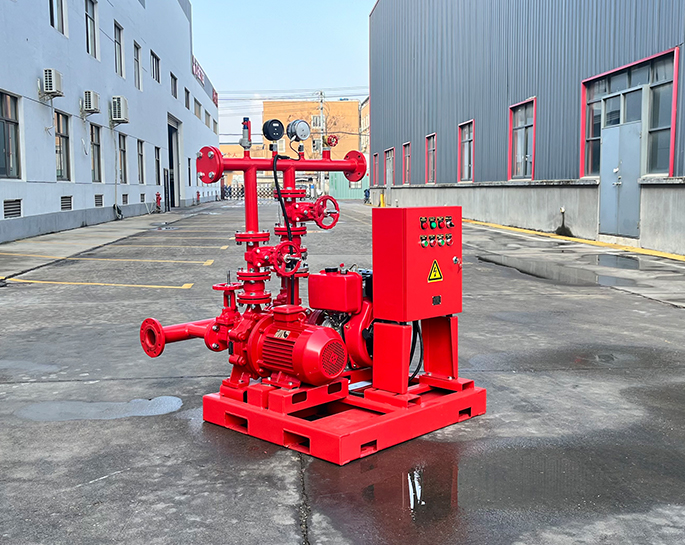In what situations would a fire pump need to be upgraded or replaced?
Jan 22, 2024
Share:
Fire pumps may need to be upgraded or replaced in various situations to ensure the effectiveness and reliability of firefighting systems. Here are some common scenarios:
1. **Aging Equipment:** Fire pumps, like any mechanical equipment, have a finite lifespan. As they age, their efficiency and reliability may decrease. Regular inspections and assessments can help determine when it's time for an upgrade or replacement.
2. **Code Compliance Changes:** Building codes and standards related to fire protection may be updated over time. If there are changes in regulations or code requirements that affect fire pump specifications, it may be necessary to upgrade or replace the pump to meet the new standards.
3. **Increased Fire Risk:** If there are changes in the occupancy or use of a building that result in an increased fire risk, it might be necessary to upgrade the fire pump to ensure it can handle the potential hazards.
4. **System Modifications or Expansion:** If there are modifications to the fire protection system or if the building undergoes expansion, the fire pump may need to be upgraded to accommodate the changes and ensure adequate water supply to all areas.
5. **Technological Advances:** Advances in technology may introduce more efficient and reliable fire pump systems. Upgrading to newer technology can enhance the performance and reduce maintenance requirements.
6. **Inadequate Performance:** If the existing fire pump is not meeting performance requirements during routine testing or actual firefighting situations, it may be a sign that an upgrade or replacement is needed to ensure the system's effectiveness.
7. **Manufacturer Discontinuation:** If the manufacturer discontinues the production of specific fire pump models, obtaining replacement parts may become challenging. In such cases, it might be more practical to upgrade to a newer model.
8. **Maintenance Challenges:** If the fire pump requires frequent and costly maintenance, it may be more cost-effective in the long run to replace it with a more reliable and modern system.
9. **Environmental Factors:** Changes in environmental conditions, such as increased susceptibility to flooding or extreme weather events, may necessitate upgrading the fire pump to withstand these conditions.
Regular inspections, testing, and adherence to relevant codes and standards are crucial in determining when a fire pump needs to be upgraded or replaced to ensure the safety and protection of the building and its occupants.

1. **Aging Equipment:** Fire pumps, like any mechanical equipment, have a finite lifespan. As they age, their efficiency and reliability may decrease. Regular inspections and assessments can help determine when it's time for an upgrade or replacement.
2. **Code Compliance Changes:** Building codes and standards related to fire protection may be updated over time. If there are changes in regulations or code requirements that affect fire pump specifications, it may be necessary to upgrade or replace the pump to meet the new standards.
3. **Increased Fire Risk:** If there are changes in the occupancy or use of a building that result in an increased fire risk, it might be necessary to upgrade the fire pump to ensure it can handle the potential hazards.
4. **System Modifications or Expansion:** If there are modifications to the fire protection system or if the building undergoes expansion, the fire pump may need to be upgraded to accommodate the changes and ensure adequate water supply to all areas.
5. **Technological Advances:** Advances in technology may introduce more efficient and reliable fire pump systems. Upgrading to newer technology can enhance the performance and reduce maintenance requirements.
6. **Inadequate Performance:** If the existing fire pump is not meeting performance requirements during routine testing or actual firefighting situations, it may be a sign that an upgrade or replacement is needed to ensure the system's effectiveness.
7. **Manufacturer Discontinuation:** If the manufacturer discontinues the production of specific fire pump models, obtaining replacement parts may become challenging. In such cases, it might be more practical to upgrade to a newer model.
8. **Maintenance Challenges:** If the fire pump requires frequent and costly maintenance, it may be more cost-effective in the long run to replace it with a more reliable and modern system.
9. **Environmental Factors:** Changes in environmental conditions, such as increased susceptibility to flooding or extreme weather events, may necessitate upgrading the fire pump to withstand these conditions.
Regular inspections, testing, and adherence to relevant codes and standards are crucial in determining when a fire pump needs to be upgraded or replaced to ensure the safety and protection of the building and its occupants.


.png)
.png)

.png)


